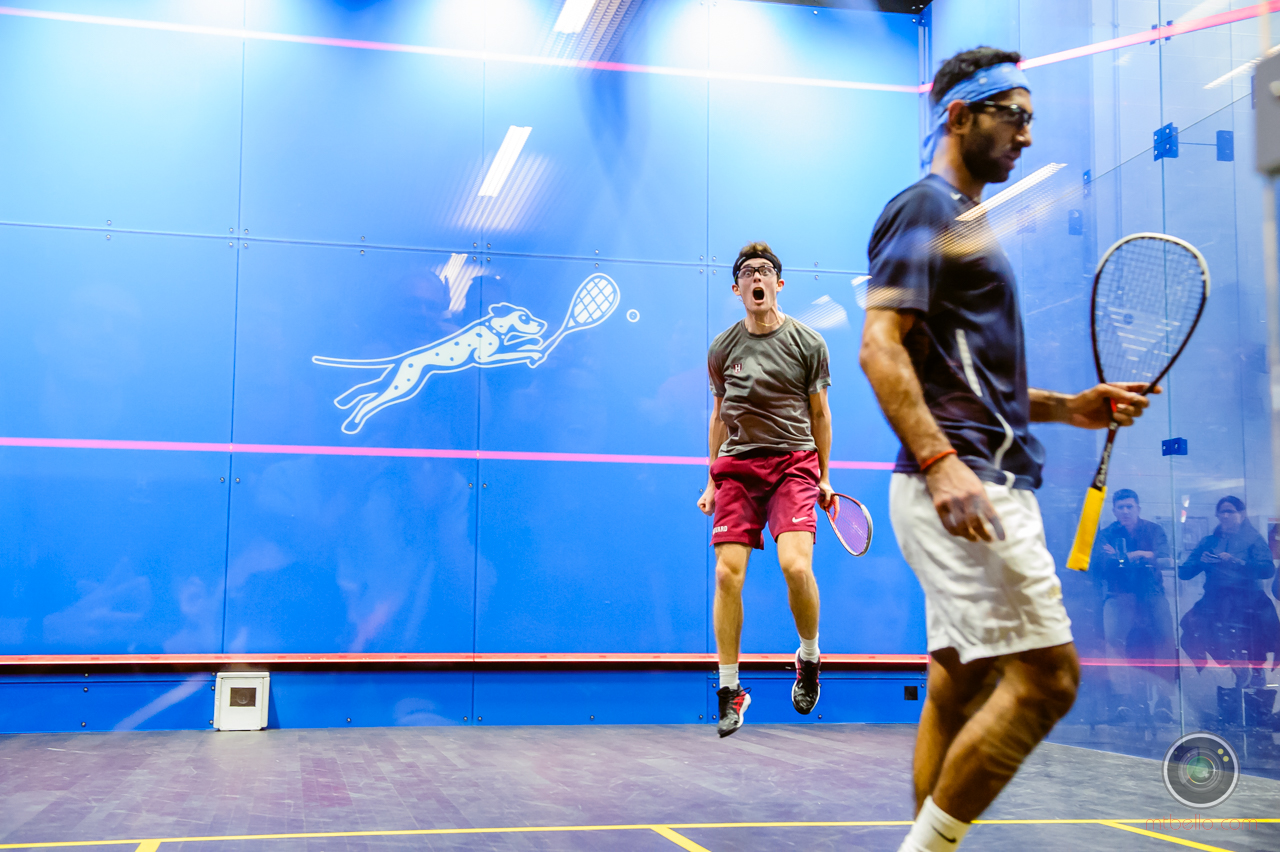
In Memoriam: David Ryan (1996 – 2024)
It is with deep sadness that we share the news of the passing of David Ryan, a beloved figure in the Harvard and College Squash Association (CSA) community, who passed away in his sleep on Saturday, October 26, 2024, at the age of 28. David was an extraordinary athlete and a cherished friend, admired for his warmth, humor, and dedication to his sport and teammates. He is survived by a loving family: his father, Eoin, an esteemed coach at Sutton Lawn Tennis Club and Squash Ireland’s 2013 Coach of the Year; his mother, Suzanne; and his sister, Stephanie. His memory will live on in the hearts of countless friends, teammates, and fans, who will forever cherish stories of his humor, tenacity, and the vibrant presence he brought to every interaction.
David Ryan’s achievements within the CSA will be remembered as legendary. Serving as captain of Harvard’s 2017-2018 squash team, he reached the peak of college squash by capturing the 2018 CSA Individual Championship title. David’s journey to this title remains unmatched: an unseeded player, he claimed the championship by defeating top-seeded athletes from Penn, Dartmouth, and Trinity, including a remarkable comeback against Trinity’s top player in the final. His historic victory, secured with a dramatic four-point surge to win the fifth game, is a testament to his resilience and grit, leaving an indelible mark on the landscape of college squash.
David’s squash journey began well before his college years. Hailing from Ireland, he was a celebrated junior champion. After college, David competed on the PSA tour, reaching the semifinals of the 2022 Limerick Open. A true competitor, David also brought humor and a mischievous spirit to every court he graced, whether with Harvard or his Irish teammates. His athletic prowess was matched by his magnetic personality, always connecting with teammates, younger players, and friends.
The below is a passage from Rob Dinerman’s A History of Harvard Squash During the Mike Way Coaching Era (2010-21) which chronicles David’s journey to winning the 2018 CSA Individual Championships.
“A TITLE FOR A LIFETIME”
David Ryan had entered the Individuals, scheduled to be played the weekend after the Potter Cup at the Squash On Fire facility in Washington D. C., but his ranking wasn’t high enough to get him into the top division, which, as noted, had been limited to the top 16 ranked players since 2015, and he had no intention of traveling to D. C. to play in the second flight for players ranked Nos. 17 to 32. Although he had compiled a spotless 15-0 combined record in dual-meet and Potter Cup play that season, he had played at No. 4 and therefore wasn’t ranked high enough to make it into the top flight. Convinced that his season and college career were over, he did not play any squash that week, which he instead spent reminiscing about the season, enjoying his free time with friends and studying for a midterm exam he was due to take the following Monday morning in a History course. But just prior to the Individuals weekend, as the draws were being finalized, he got a phone call from Coach Way informing him that enough players (a full half-dozen), exhausted by the grueling three-match Potter Cup weekend just past, had withdrawn from the Individuals top flight for there to be a spot available for him if he was still interested. Included in the group of withdrawing players was the 2017 Individuals champion Osama Khalifa, whose lower-back condition had flared up enough to prevent him from defending his title, just as had happened with his older brother Amr, who similarly had been unable to play in the Individuals during his senior year in 2015 due to the same injury.
Ryan had not played in the Individuals since his freshman year, when, as previously detailed, he surprised everyone with his run to the semis. During the intervening seasons, he had been frustrated at not having the opportunity to challenge the top players at other schools due to the strength of Harvard’s top three players — now the opportunity he had craved for years was being dropped into his lap at the last possible moment, and he was not going to pass it up. He advanced to the semis with Friday wins over Andrew Douglas and Alvin Heumann, the No. 1 players at Penn and Dartmouth respectively. Those results created an additional challenge, since Ryan, not expecting to make it that far, had only packed two shirts and two pairs of shorts in his suitcase! This meant that, after defeating Heumann Friday evening, Ryan had to go back to his hotel room, hand-wash his clothes in the shower and hope they would be dry enough for him to wear them the following day.
His semifinal opponent, teammate Timmy Brownell, had beaten Princeton’s top player Youssef Ibraham in the quarterfinals and had never lost any of his many challenge matches (the majority of which had gone five games) with Ryan during their two years at Harvard, nor had he lost the one time they had played each other in an official tournament at the 2014 World Junior Championships in Namibia. This match went to a fifth game as well, but this time Ryan jumped off to an early lead, which he closed out with an 11-7 tally.
Waiting for Ryan in the final was the top-seeded Kush Kumar of Trinity College, who had cracked the top 100 in the PSA rankings prior to starting college. There was very little turnaround time between Ryan’s semi, which didn’t end until nearly 11pm, and the Sunday-morning final, and Kumar, whose straight-game semifinal win over Abouaish had neither lasted nearly as long nor ended nearly as late the Ryan-Brownell match, was definitely the fresher player. In spite of this, Ryan got off to a great start, winning the first game 11-4 and continuing his momentum through the second game as well. He knew that Kumar was a “momentum” player and he therefore tried varying ways of keeping Kumar off his rhythm. These ranged from implementing a game plan predicated on deep, straight drives mixed with counter-attacking straight drops, to occasionally resorting to what he later termed “tactical stoppages in play,” to sometimes trying an unorthodox shot out of the blue. “I needed to pull out everything I had up my sleeve,” he wrote years later about his approach to that match, and his strategy and execution were both throwing points on the pile and getting into Kumar’s head. But by mid-match Ryan’s legs were feeling the strain of the weekend, and when Kumar, who had been told by Coach Assaiante that he was leaving too many loose balls and that he therefore needed to “tidy up the court,” rallied to win the third game and jumped out to a 7-1 lead in the fourth, Ryan wisely decided to let that game go in order to conserve his energy for the fifth game.
During most of those two mid-match games, Ryan’s increasing fatigue affected the width of his drives, opening up the court for Kumar to run him from front to back and impose his excellent front-court game. In the break before the last game began, Saad Abouaish, Brownell and Coach Way exhorted Ryan that this would be the last game he would ever play wearing the Crimson colors and that, for better or worse, he would remember the upcoming game for the rest of his life. Abouaish, who knew Kumar’s game well after the several matches they had played during the past two years, also advised Ryan to mostly drive the ball down the near wall when he was up front, rather than going cross-court, since Kumar appeared to him to be “sitting” on the cross-court and wasn’t reacting as well when Ryan instead hit a straight drive.
Ryan clawed his way to a slim 7-5 advantage, but Kumar then won five of the next six points, the last of which, a stroke call in his favor when there was contact near the right wall, gave him a 10-8 lead, double-match-ball. The call infuriated Ryan, which, under normal circumstances, as Ryan later acknowledged, “would have instigated a strongly worded conversation with the referee and a lot of bad language under my breath aimed at Kush. But, in this instance, after a loud roar of ‘Nooooo!’ at how wrong the decision was, it fired me up like I have never felt before. It gave me a second wind (or third or fourth wind), to the point that I know I wasn’t even thinking, ‘Oh no, I’m two match balls down.’ All that was going through my head is that I am not losing another point, no matter what.” Nor did he, as each of the match’s last four points landed in Ryan’s column. Trailing 10-8, he volleyed a perfect forehand drop winner off a Kumar backhand cross-court, following which he legged down a Kumar drop shot to the front-left and hit a bold but risky cross-drop winner. Ryan’s momentum carried him close to the left wall, leaving the whole right side of the court open if Kumar had been able to retrieve the ball. He dove forward in a vain attempt to reach it and lay there on the ground for quite a while. When he finally rose to his feet, there was a demoralized aspect to both his body language and facial expression during the brief stoppage (while someone raced in with a towel to dry the area of the court where Kumar had landed), almost as if Kumar realized that his best chance to win the match had come and gone.
At 10-all, following a tense exchange near the front forehand corner, Kumar nearly hit a forehand cross-court past Ryan, who got just enough of his racquet on the ball to send it along the left wall, in response to which Kumar backhanded a working-boast volley into the tin. It was a low-percentage shot that appeared to have a bit of desperation to it. On the final exchange, Kumar hit a good backhand straight-drop that drew Ryan too far out of position to muster anything more than a weak backhand cross-court directly onto Kumar’s racquet at mid-court. Ryan later said that by that stage he had become so rubbery-legged that he knew that that was his last swing of the point either way, and that all he could do was pray that his shot would somehow catch a dead nick or that Kumar would mishandle the return. With the entire right side of the court exposed, all Kumar had to do to win the point was get the ball back to the front wall.
However, whether out of mental or physical exhaustion, his return went right into the bottom of the tin as an incredulous Ryan jumped for joy, yelling “No way!” and brandishing his fist to celebrate the culmination of his improbable and extremely compressed run from non-participant as of less than 96 hours earlier to Individuals champion. It was the first time that a player had rallied from match-ball-down to win the Individuals in the 28 years since Jenny Holleran, Harvard Class of 1990, had hit a backhand drop-shot serve-return winner against Yale’s Berkeley Belknap on simultaneous-match-point in 1990. It was also the first time this had happened in the men’s Individuals since 1939, 79 years earlier, and also on a simultaneous-match-point, when Harvard star Kim Canaverro rifled a hard serve right into body of his opponent, Princeton’s Stanley Pearson Jr., only to have Pearson instinctively reflex-volley the ball barely an inch above the tin.
The opening lines of the Crimson write-up read, “David Ryan was never supposed to win the 2018 College Squash Association (CSA) national individual championship. Nor was he supposed to be in the finals, semifinals, quarterfinals, or even the opening round.” Asked how, after playing No. 4 all season, he was able to beat three No. 1’s in as many days, Ryan’s interesting response was, “I had never gone up against those guys, but the thing was that they hadn’t played me either, so they didn’t really know what to expect. Maybe I got them a little bit nervous, when it came down to it, or maybe some of them were overconfident about playing someone who had spent the season at No. 4. I was a couple of match balls down and I was just in that sort of mindset that I really didn’t want to lose, no matter what. I was going to leave it all out there. It’s my last ever college squash match, probably my last squash match. period. I have to say the most memorable part of the year was definitely the moments after winning the individual championship. The teammates that were actually at the tournament stormed the court. My coaches were almost in tears. And when I got back to the airport in Boston, my whole team was there holding posters and champagne and screaming my name. It didn’t feel like an individual championship. It felt like winning a team championship.” In recognition of his pluperfect season, Ryan was unanimously voted team MVP by his teammates and he, Abouaish and Brownell all made first-team All-American.
NOTE: This article has been adapted from articles by Rob Dinerman that first appeared earlier this week on the squash website Dailysquashreport.com.
David Ryan, 1996-2024, 2018 Intercollegiate Individual Champion



